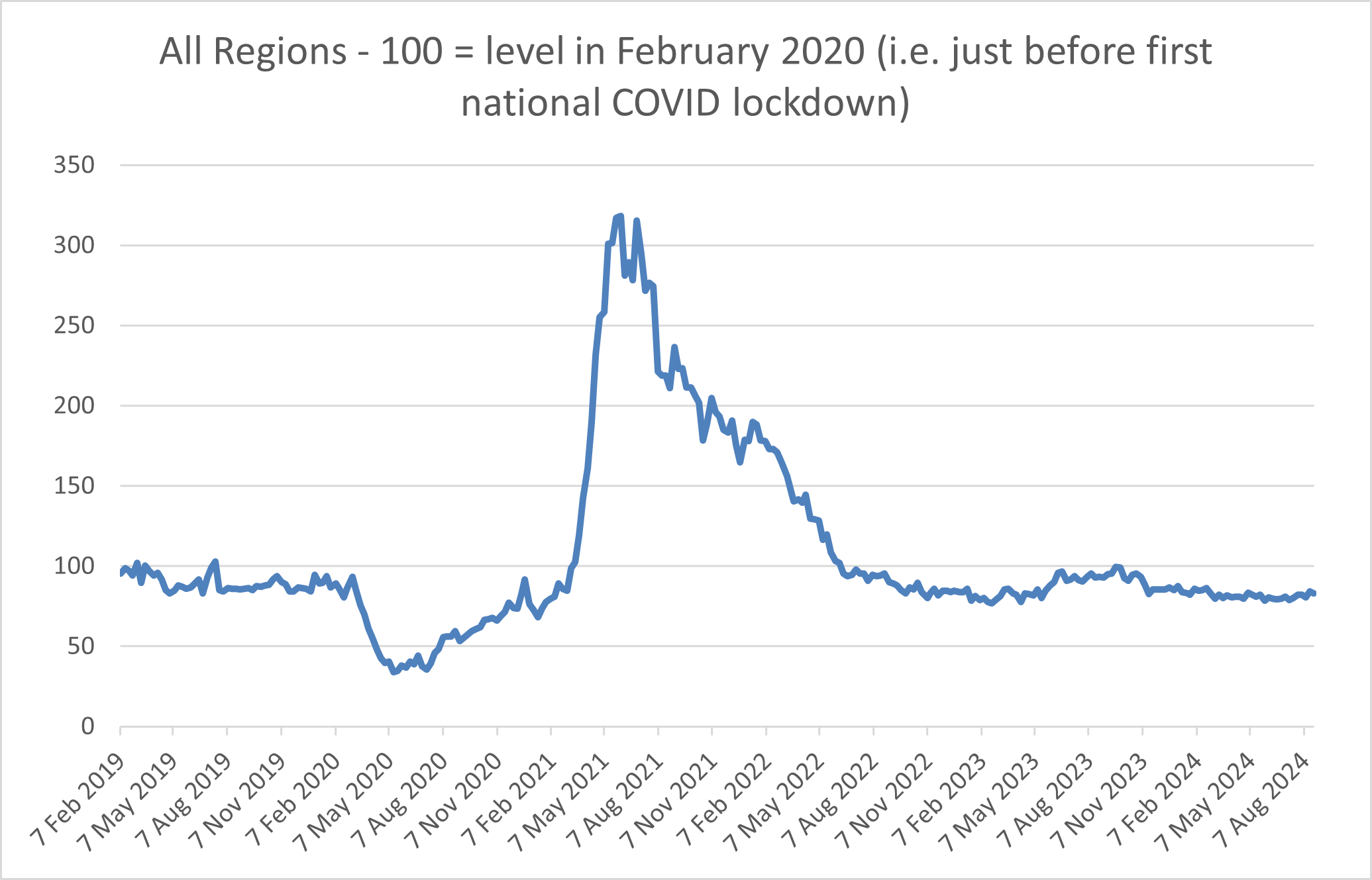Charlie Ball looks at the latest data on vacancies and apprenticeships, before summarising reports on multigenerational workforces and whether or not job ads tend to specify degree requirements
The total number of online job adverts on 23 August 2024 was 2% lower than the previous week and was 17% lower than the equivalent week of 2023.

Job ad figures have been bumping along at between 80% and 85% of pre-COVID figures for pretty much the whole of 2024. As I predicted at the start of the year the general election has had little, if any effect on that, but nor have we seen much in the way of other broad changes either.
There are sectoral differences - the data on vacancies in the arts does appear to show a post-election bounce, and we're also seeing an(other) increase in vacancies in the already-tricky education sector, although we have to be mindful that this covers both schools, where there is recruitment, and universities where there are job losses. Marketing and PR, though, seems to be going through another fall in vacancies and we can also see in the Graduate Outcomes data this saw a fall in new graduate entrants in 2023.
New data from the fortnightly Business Insights and Conditions Survey from the Office for National Statistics (ONS), meanwhile, suggests that the large majority of UK businesses (82.1%) expect to maintain headcount and the balance is a slight increase is expected: 13.9% of all businesses with more than ten employees expect an increase in headcount in September opposed to 9.4% expecting a decrease. Education, which as we've seen from the vacancy data (and might expect for the time of year) is much the most likely industry to expect to recruit, with 14.2% of employers looking to up their headcount in September, while 12.1% of accommodation and food service providers expect to reduce headcount as the tourist season comes to a close and prices rise.
Data on proposed redundancies, running to 11 August, suggests a dip, with redundancy rates running at about three quarters of the same time last year.
Some 73% of business leaders in Great Britain have multiple generations in their workforce today as populations age and working lives extend.
Latest data on apprenticeships
The Department for Education have released new apprenticeship stats:
- Apprenticeship starts were up by 1.1% to 278,590 compared to 275,630 reported for the same period in the previous year.
- Most apprentices are not new education leavers. Under 19s accounted for 25.1% of starts (70,020).
- Advanced apprenticeships accounted for 43.0% of starts (119,900) while higher apprenticeships accounted for 36.1% of starts (100,490) - this is up 7.3% on the same period last year.
- Higher apprenticeships continue to grow in 2023/24. Higher apprenticeship starts increased by 7.3% to 100,490 compared to 93,670 in the same period last year.
- However, overall learner participation decreased by 2.3% to 687,770 compared to 703,670 last year.
- There are lots of data tables and tools you can look through to get a fuller picture here as well.
The Recruitment and Employment Confederation (REC)'s most recent labour market tracker also suggests a reasonably flat jobs market. REC covers agencies so isn't a full picture of jobs but is a good guide to larger labour market movements. They produce this report with data from jobs aggregator Lightcast.
Like the ONS's data from Adzuna they find a relatively stable labour market since late spring but are also detecting a modest recent bounce, which they attribute to skills shortages and a mild uplift in employer confidence as interest rates and inflation start to come down and economic growth looks a little better. The agencies are seeing a particular increase in healthcare hiring, and in construction and engineering technicians at graduate level, alongside other growth in train and bus driving and in jobs in construction.
How many job ads specify a degree requirement?
Indeed has conducted an interesting piece of work looking at whether job ads specify degree qualifications and coming to the conclusion that in the UK it is not actually very common.
Only about 14% of UK job postings explicitly mention any kind of formal educational requirements, and the proportion explicitly asking for degrees is low and stable. Indeed attributes this to three main factors - the first is an increase in skills-based hiring, and in sectors where that is becoming more prominent, there are signs that degrees are being requested less frequently. Second, a relatively high proportion of the workforce with degree-level qualifications (it's 53% according to Annual Population Survey data), meaning you'll tend to get a high level of graduates applying for jobs anyway. And third, occupational segregation means that many roles are de facto degree entry anyway. However, Indeed also finds sectors with higher education requirements typically have better pay.
The benefits of multigenerational workforces
The Work Foundation have been looking at multigenerational workforces. Some 73% of business leaders in Great Britain have multiple generations in their workforce today as populations age and working lives extend, and there are four generations in the workplace, with workers born in the 1950s and 1960s now working alongside people born in the 2000s.
Business leaders in Britain agree their organisation benefits from the diverse perspectives brought by a multigenerational workforce, with those with a multigenerational workforce most likely to agree that there are benefits (83% vs 62% for those without a multigenerational workforce).
31% agree emphasising diversity and inclusion is important in creating a positive work culture for a multi-gen workforce, however only 18% include age in Equality, Diversity and Inclusion policies. Only 16% have a menopause support policy, and just 13% have age champion schemes.
To navigate the multigenerational workforce, 49% agree that flexible work hours and location is important for a positive work culture. However, only 32% of SMEs offer training for remote/hybrid working against 44% for large organisations.
45% agree clear communication and transparency from leadership is important, but only 21% have line management training specifically for multigenerational workplaces in place.
Was this page useful?
Thank you for your feedback
